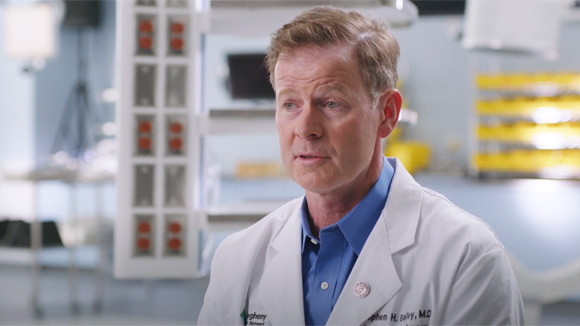Transcatheter Aortic Valve Replacement

Transcatheter aortic valve replacement (TAVR) is a minimally invasive procedure that replaces a damaged valve with a man-made valve in patients with severe aortic stenosis. This procedure is also referred to as transcatheter aortic valve implantation (TAVI).
Aortic valve stenosis is a type of heart valve disease that narrows the aortic valve and can be treated with a heart valve replacement procedure, such as TAVR. As the heart works harder to pump blood, the risk of heart failure and death increases. A heart valve replacement or aortic valve implantation lowers this risk by improving blood flow and decreasing heart strain.
Heart valve specialists at the Allegheny Health Network (AHN) Cardiovascular Institute are nationally recognized for their expertise in performing transcatheter aortic valve replacement (TAVR). We perform a large number of TAVR procedures every year.
TAVR vs. surgical aortic valve replacement (SAVR)
Surgical aortic valve replacement (SAVR) is traditional, open-heart surgery. This is the standard approach to replacing a diseased heart valve. Some people with heart valve disease have other health issues that make open-heart surgery too risky. Transcatheter aortic valve replacement (TAVR) is a minimally invasive aortic valve replacement procedure, which can be done through the femoral artery in the leg (transfemoral), or a small incision in the chest (transapical), helping patients with heart disease who are at a high risk.
What is the TAVR procedure?
To perform the TAVR procedure, your doctor will:
- Thread a catheter (long, thin tube) through the femoral artery in the leg until it reaches the heart.
- Insert an expandable replacement valve through the catheter to the heart.
- Use a small incision in the chest to help place the replacement valve.
- Expand the replacement valve, which pushes the diseased valve leaflets out of the way.
Benefits of TAVR surgery
Your physician will assess your personal situation to determine if TAVR is right for you. Benefits of TAVR include:
- Smaller chest incisions or no incision at all.
- No cutting of the breastbone or opening of the ribcage.
- No need for a heart-lung bypass machine.
- Less pain and scarring.
- Faster recovery time.
- Reduced risk of infection.
What to expect
Before your doctor begins the procedure, a specialist will insert an IV into your hand or forearm. You may be given the option of taking a sedative to help you relax. Medications to prevent blood clots and reduce the risk of infection may also be administered through the IV, depending on the patient.
During the procedure, your doctor will insert a catheter into a blood vessel in the groin to reach the heart. X-ray images or echocardiogram pictures help guide the procedure. Once the catheter reaches the heart, a replacement valve made of cow or pig tissue is inserted through the catheter and set into place in the area of the aortic valve. As soon as the new valve is securely set, the doctor will remove the catheter.
TAVR recovery
Hospital recovery times after TAVR vary from person to person. In most cases, patients are released to go home the following day.
Before you leave the hospital, your team of specialists will explain how to care for your incisions and how to watch for signs of infection.
You may be prescribed several medications, including blood thinner and antibiotics. You will need to have regular checkups with your doctor and imaging tests to ensure the replacement valve is working the way it should.
To prevent further health problems, you should commit to heart-healthy habits, such as:
- Quitting smoking.
- Eating a healthy diet.
- Getting regular exercise.
- Maintaining a healthy weight.
TAVR complications and risks
All surgeries come with potential risks. Those associated with TAVR include:
- Bleeding.
- Complications with the replacement valve, such as leaking or the valve slipping out of place.
- Kidney disease.
- Infection.
- Stroke.
- Death.

"We work really hard to minimize trips to the hospital and make each visit as efficient and effective as possible."
Stephen H. Bailey, MD — System Chair, Department of Thoracic and Cardiovascular Surgery
AHN Heart Valve Clinic
All AHN hospitals provide heart valve disease care and treatments. If desired, you may receive TAVR care at the AHN Heart Valve Clinic located within the AHN Cardiovascular Institute at Allegheny General Hospital. AHN Cardiovascular Institute specialists also perform the TAVR procedure at Forbes Hospital, Jefferson Hospital and Saint Vincent Hospital.
Contact us
Call (412) DOCTORS (412) 362-8677 to request an appointment about Transcatheter Aortic Valve Replacement treatment at AHN.
-
Appointments
Cardiovascular Institute(412) DOCTORS
By accessing this video, I understand that I am leaving the AHN website and I will be re-directed to an external website operated by a third party platform provider. I acknowledge that the platform provider may collect personal information about me, and about the video that I view, on their platform and may use and disclose this information in accordance with its privacy policy. I agree that Allegheny Health Network is not responsible for the data collection and use practices of this third party.

